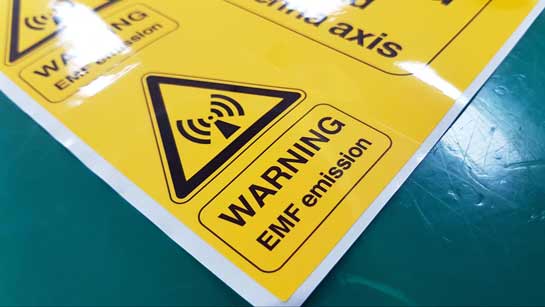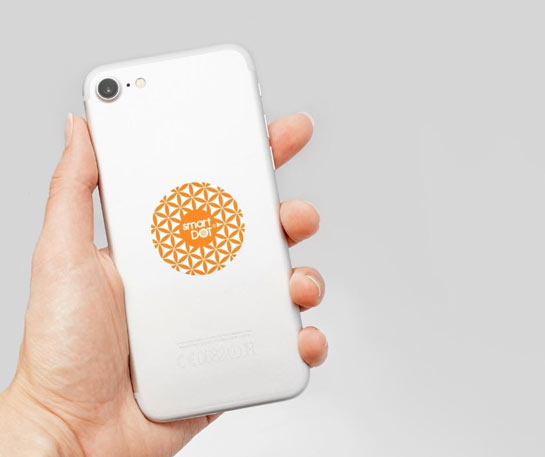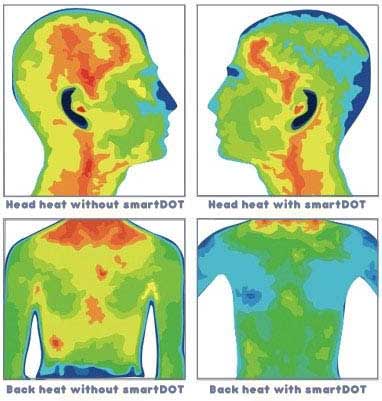
When my husband and I decided we wanted to have a baby, I also decided to go on a pre-baby cleanse.
I wanted to give our baby the best chance of being born happy and healthy.
And I knew that, if I were as healthy as possible before conceiving, it would help our baby-to-be. So, I stopped drinking, cut out processed foods, and got on a fitness schedule.
But, the more I started researching, the more I realized that a diet and exercise cleanse wasn’t going to be enough — not when I was surrounded by low-level radiation everywhere I went, every day of my life.
You see, the modern technology we use every day emits electromagnetic fields, or EMFs, which are a source of electromagnetic radiation.
I couldn’t imagine being pregnant and constantly worried about that level of exposure.
I needed to go on a technology cleanse, too. But, that was hard to do when I had to use my cell phone and computer for work.
That’s when I found smartDOT, an ingenious device that reduces your EMF exposure.
What Is EMF Radiation?

Electromagnetic fields exist anywhere that there’s an electrical charge or current.¹
Everything from your wall outlet to your desk lamp to your Wi-Fi router creates an EMF.
In low levels, like those emitted by your desk lamp, EMF radiation isn’t harmful.
But, some of your household devices emit higher frequency EMFs, known as radiofrequency fields.¹
Microwave ovens, laptops, cell phones, and Wi-Fi routers all create radiofrequency fields and, with their higher frequency, comes a higher amount of radiation.¹
As levels of EMF radiation increase, so do the potential side effects.
Many people claim to be sensitive to EMF radiation and report experiencing headaches, anxiety, fatigue, muscle pain, nausea, and short-term memory loss as a result.²
If these more symptoms don’t make you want to unplug your Wi-Fi router, there’s now research that links EMF exposure to lower fertility rates and pregnancy complications.
How Does EMF Radiation Affect Female Fertility?

Research on EMFs and Fertility is still in the early stages, but there are a lot of reasons to be concerned.
One animal study showed that EMF exposure increased the amount of time between each ovulation in female rats, giving them fewer opportunities to become pregnant.³
Researchers also believe that EMFs damage ovarian tissue.³
Other studies have shown a connection between EMFs and hormone regulation, reproductive function, and fetal development.⁴
And research on the relationship between birth defects, miscarriages, and EMF found that EMFs can harm the reproductive system.³
Once I learned all of this, I realized that if I wanted to conceive and have a healthy pregnancy, I needed to reduce my EMF exposure.
But since EMF exposure is everywhere, I thought it would be an impossible task — then smartDOT made it easy.
What Is smartDOT?

smartDOT is a magnetic disk that you attach to your personal electronics.
It works similarly to the magnetic strip on a credit card, except the magnet on your smartDOT is programmed with a specific, naturally occurring frequency that harmonizes the EMFs of your electronics.
It converts the high-frequency EMFs of your devices into a lower frequency that its less harmful for the human body to absorb.
Get one smartDOT for each device you own, and slip it inside your cell phone case or attach it to your laptop, tablet, television, or Wi-Fi router.
You don’t need to worry about putting the smartDOT in a specific location on each device, and you don’t need to worry about it wearing off. On a cellphone we would recommend putting it in the center on the back of the phone.
smartDOT lasts indefinitely, so it’ll keep supporting you for as long as you have it.
How Does smartDOT Protect You From EMF Radiation?
smartDOT was created using independently tested technology, and the company has run multiple tests to ensure their product’s effectiveness.
In one test, they took a heat map of participant’s bodies after talking on a regular cell phone and compared it to a heat map after talking on a cell phone with smartDOT.

They found that the cell phone with smartDOT produced much lower levels of heat around the user’s ear and side of the face.
In another experiment, the cell phone with smartDOT led to fewer disturbances in participants’ biofields.
Because there are many sources of EMF radiation, including radio signals, cell phone towers, satellite signals, and other people’s devices, smartDOT can’t protect you from all EMF radiation.
But, it can help you decrease your exposure from one of your main sources of EMFs — your own devices.
And reducing your exposure to EMF can help reduce its negative impact on your body and reproductive system.
Get smartDOT and Get Back to Baby-Making

When you’re preparing for a baby, you have enough to worry about without adding EMF exposure to the list.
My husband and I have a to-do list a mile long, and now that we’ve checked off getting a smartDOT for all our devices, we can move on to the fun stuff — like picking out paint colors for the nursery.
smartDOT comes with a 90-day money-back guarantee, so if you’re not satisfied, you can send it back. And right now, smartDOT is available with this special offer so you can get peace of mind for an even better price.
This product is not intended to diagnose, treat, cure, or prevent any disease or health condition. The information provided herein should not be considered as a substitute for the advice of a medical doctor or other healthcare professional. As each individual is different, results may vary.
References: References
 HealthSportsOutdoorsFamilyPetsTrending GiftsPrivacy PolicyTerms And Conditions
HealthSportsOutdoorsFamilyPetsTrending GiftsPrivacy PolicyTerms And Conditions
